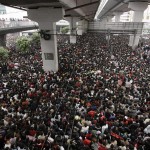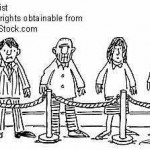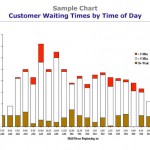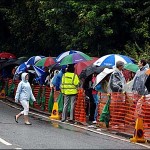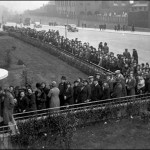Queueing was at one time regarded as a peculiarly British trait. We would stand stoically in line with a long-suffering expression and wait our turn. Some would moan and whinge about it, expect whatever it was we were queueing for to have run out by the time we got to the front.
What we would resist at all costs is somebody pushing in. That is decidedly not cricket and is more frowned upon than any almost other form of public behaviour. It’s not illegal, but it’s most definitely immoral and the sign of a cad and bounder!
On odd occasions queues are an opportunity to demonstrate that we have not lost the finer points of good manners and courtesy – the gentlemanly behaviour everybody expects of us. After you, I insist! Noblesse oblige… We feel better for doing a good deed, and the person we allow to pass before us is filled with the milk of human kindness.
That said, is there anything more dispiriting than, say, arriving at a destination only to find a 3-hour waiting line? It’s something we all hate, but in the spirit of democracy, equality and fraternity we have a responsibility to stay in that queue until our turn arrives. It’s arguably most frustrating when you’ve flown in on your way back from holiday but then have to stand around for further hours to get through the passport queue before you can get to that wonderful moment of arriving at your inner sanctum, putting down the bags and sinking into your favourite armchair.
So you can imagine how Brits feel about the UK Border Agency’s new policy of reserving fast-track lanes for “high value” travellers. It’s an insult. Maybe some would love to see the celebs saunter up to the front of the passport lane, grinning and waving for the cameras while the rest of us follow the long route, but to most people that is galling in the extreme.
Over on the continent though, we Brits find queueing culture is often an alien concept. People push and shove to get places, the devil take the hindmost! Even little old ladies have sharpened elbows to get themselves to the front. Maybe that’s a relic of the wars, when people needed to get to the front and get fed just to survive? Or maybe they are just more selfish than us?
You would think Americans would be the most egalitarian nation on earth, and sure enough they have developed queueing to new heights of sophistication. They invented the space-saving concept of serpentine queueing, which gives you the illusion of being closer to the end goal and at least seeing the queue move.
However, things are changing: now your dollar buys you the right to move forward faster. Americans are now exploiting this urge to queue-jump legitimately by encouraging people to pay more for the privilege. This trend began with priority queues at airport terminals, then the “fast pass” ticket at the Disney parks, whereby you were guaranteed a place in a shorter queue at a particular time, and could therefore go off and enjoy another ride in the meantime without having to join a long queue again when you got out.As one Atlanta commuter put it:
“To me, my time is worth money – it’s as simple as that”
The principle now seems to have been extended to fast food queues, road lanes and anywhere else they can gain a fast buck to exploit human desire to avoid waiting for anything. In the article linked above, one senator describes this trend as”un-American”:
“This is not about improving traffic times. It’s just about giving options to people who can afford it. What it does is it creates what I call the politics of envy. It separates the haves and the have-nots,” he says. “We’ve always prided ourselves on not being so stratified. Our founding fathers never had this idea of, ‘I got mine, now you go get yours’. That’s not anywhere in the constitution, the bill of rights, the declaration of independence. But that’s what this creates.”
An academic replies that in terms of matching supply and demand:
“Are priority queues “un-American” Paying a higher price to get better and faster service is a worldwide custom, not just an American one. It is an example of “demand management”, in which price of a service is matched to demand. In non-queueing situations we see it all the time – hotel rooms and car rentals are cheaper on weekend days, car parking charges are less in off-peak hours, etc. I do not see differential service based on differential pricing as un-American – it is simply another manifestation of matching supply and demand by market pricing. Often those paying the highest price subsidise others who can then enjoy the service, though perhaps with a bit of temporal inconvenience.”
Needless to say, there are theories aplenty about queueing, models developed on how best to prevent frustration, though if demand and supply are among the primary drivers it’s no surprise that for the most urgent cases we have a greater propensity to queue, be it tickets for the most popular music or theatre acts, the ones that are sold out within minutes of opening, or when we are ill and need that doctor’s appointment, or when the money hasn’t come into our bank account, for example. This is what an economist would call “inelastic demand”, so we put up with it.
And then, sometimes you have no choice. You’re in your car in a traffic queue; there is an accident or roadworks ahead and it’s rush hour, so every man, woman and dog are on this road. The queue is stationary and you are moving nowhere fast. Nothing you can do but cool your heels, listen to the radio, reprogramme your satnav and wait. Getting angry won’t help any. You might find an alternative route but maybe everyone else is thinking the same. You can try using a different lane, and sometimes it might move faster, though that may be reversed up the road and occasionally there are the arseholes who resent you trying to gain an advantage and deliberately block up the road to prevent you joining later. The psychology of traffic queues has been much documented, but never gets any easier when you’re actually out on the road. You still look for those tiny victories that advance you a few seconds further up the queue. You get to your destination eventually – and the more urgent your reason for being there by a set hour and the later you are will affect your mood and behaviour, but unless your car can sprout helicopter blades you are still stuck there until you can pass the obstacle and move forwards. C’est la vie.
It’s bad enough when we’re standing or driving but telephone queueing is surely worse still. We are left hanging there not knowing what is going on, so the company whose customer service call centre we are trying to reach (and arguably these are places set up to keep the customer at arms length and feed them with as little information as possible) play soothing music interspersed with cheerful messages telling us we are moving up the queue. The longer it takes, the more irritable we become, and the more we are placated the more explosive we are likely to get and react badly to whatever factor – like call centres 0ffshored to the other side of the globe, maybe?
Small wonder that whatever mathematical models are applied by the theorists, the best results are achieved by companies who own your problem and take initiative to contact you and keep you informed. Having to queue again because they have done nothing is surely the ultimate insult.
Of course, we can sometimes help ourselves by choosing a better time to join any given queue, planning our assault so we get in quickest. That would be a logical choice, but the human emotion is simpler: I am the most important person so I should be able to get access when I want and without delay. Sadly, thousands of other people going about their daily business are thinking the same.

